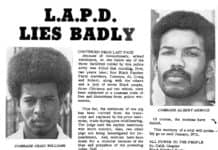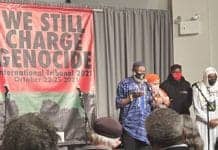by Jalil Muntaqim
The hunger strike victory – settlement of the class action suit against solitary confinement – is fantastic, but now, more hard work confronts them all. They will continue to be in a relentless fight to prevent COs (correctional officers) from destroying the unity and continued political determination of the vision for prison reform in California.
 Obviously, there will come a time in which the prisoners will need to essentially rebrand, identify and complete what they started – the five demands – and to ensure the sustainability of organizing as well as build capacity to grow the work into a substantial statewide political campaign for prison reform. I sincerely hope they will consider this victory as a tactical victory, not a strategic one – especially when parole decisions continue to be constricted and there is an ongoing need for more programs that serve to support prisoners for their return to the community.
Obviously, there will come a time in which the prisoners will need to essentially rebrand, identify and complete what they started – the five demands – and to ensure the sustainability of organizing as well as build capacity to grow the work into a substantial statewide political campaign for prison reform. I sincerely hope they will consider this victory as a tactical victory, not a strategic one – especially when parole decisions continue to be constricted and there is an ongoing need for more programs that serve to support prisoners for their return to the community.
In fact, I hope they will begin the process of floating a proposal to broaden the overall campaign for prison and parole reform and ultimately end mass incarceration – demand abolition. If they can successfully make this transition, they will certainly create the paradigm for the country to replicate.
One of the first things that must be done as part of the transition and to move the prison-cultural-psychological determinant forward would be to educate the prison and public about how the state will seek to undermine their success. For example, publications should have issues solely devoted to incidents in which state officials (COs) attempt to undermine the Agreement to End Hostilities.
I hope they will begin the process of floating a proposal to broaden the overall campaign for prison and parole reform and ultimately end mass incarceration – demand abolition. If they can successfully make this transition, they will certainly create the paradigm for the country to replicate.
It is these testimonies and examples of fight-back that can serve to strengthen the capacity to build unity and uniformity in the fight. Secondly, this would broaden the future vision of the campaign from the inside out and then the outside in. I imagine family members and loved ones will want to concentrate on parole issues and prison medical and health concerns as the next major issues to be tackled.
Jalil Muntaqim
Jalil has been imprisoned since 1971 when, at the age of 19, he was active in the Black Panther Party and the Black Liberation Army. He spent from 1975-77 in San Quentin before being sent to New York state prisons. Send our brother some love and light: Anthony Bottom, 77A4283, Attica Correctional Facility, P.O. Box 149, Attica, NY 14011-0149.

 Store
Store












